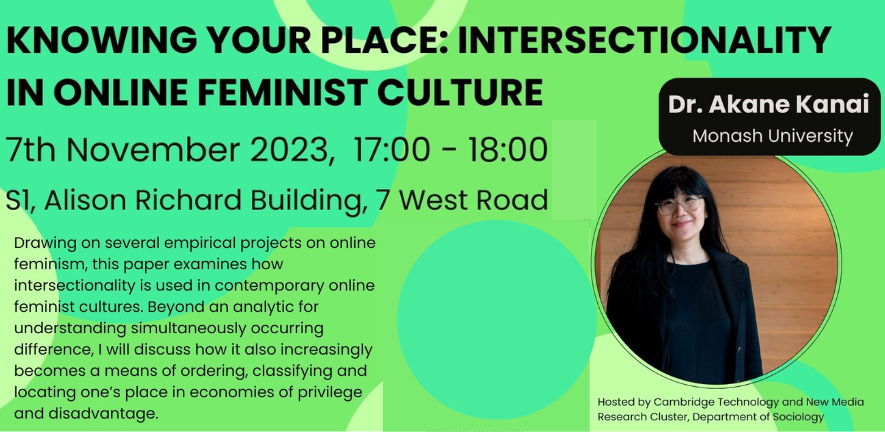
Tuesday 7 November 2023 17:00-18:00 | S1, Alison Richard Building, 7 West Road, CB3 9DT
Speaker: Dr Akane Kanai (Monash University)
Drawing on several empirical projects on online feminism, this paper examined how intersectionality is used in contemporary online feminist cultures. Beyond an analytic for understanding simultaneously occurring difference, Dr Kanai discussed how it also increasingly becomes a means of ordering, classifying, and locating one’s place in economies of privilege and disadvantage.
ABSTRACT
This paper discussed how intersectionality materialises as a productive concept in online feminist cultures. Drawing on a number of empirical projects on online feminism, Dr Kanai argued that intersectionality has become a central heuristic through which contemporary feminist subjects are made. A concept most famously articulated by Kimberlé Crenshaw in the 1980s to unpack single-axis conceptions of oppression, intersectionality increasingly locates, orders, and places. In Dr Kanai’s projects, in Maria Lugones’ (2002) words, intersectionality spatialized the relations of her participants, with respect to the asymmetries of power that constituted those relations. For all participants, intersectionality was ‘useful’ in that it provided certain orientations to the social world. But its uses were not the same for everyone. As Sara Ahmed (2019) explains, use differs in connection with what you are used to. As race and gender are ‘transacted’ and decontextualized in the visual and textual cultures of the Internet, marginalized others risk the reinforcement of their status as objects to be circulated, ‘interacted with’, and shared.
BIOGRAPHY
Akane Kanai is a Senior Research Fellow at Monash University, Australia. Her research investigates the shaping of contemporary identity through the politics of mediated cultures, particularly online and in popular culture. In 2021, she was awarded a Discovery Early Career Award Fellowship by the Australian Research Council to undertake a three-year project on the impact of everyday online feminisms on young people. Her work can be found in journals such as Feminist Theory, Feminist Media Studies, the Journal of Communication, and Cultural Studies. Her monograph, Gender, Relatability and Digital Culture, is published by Palgrave (2019).
